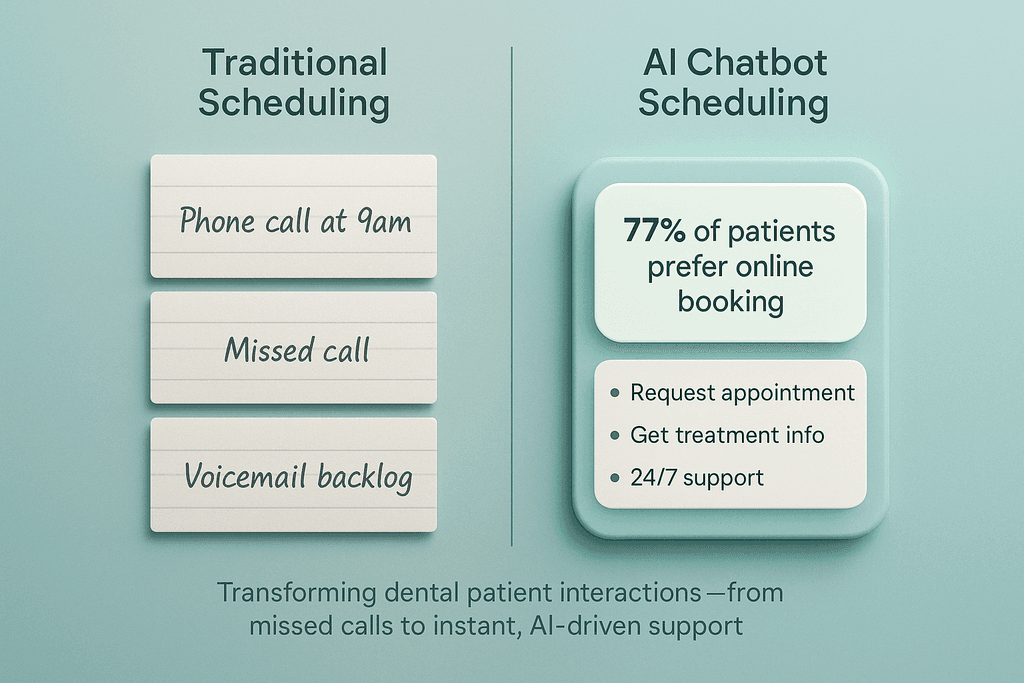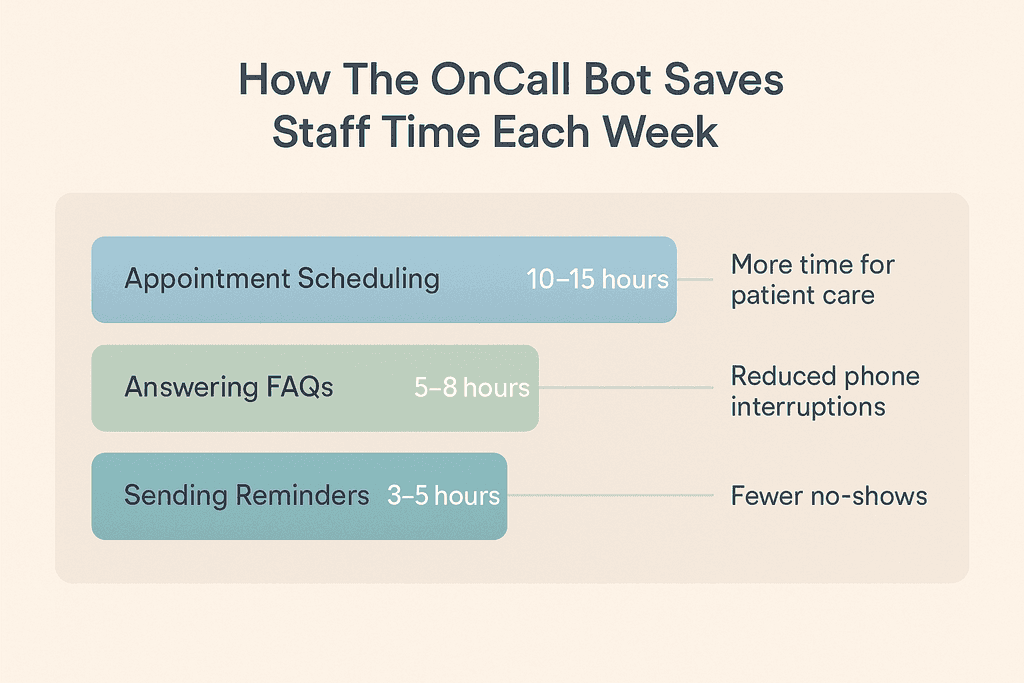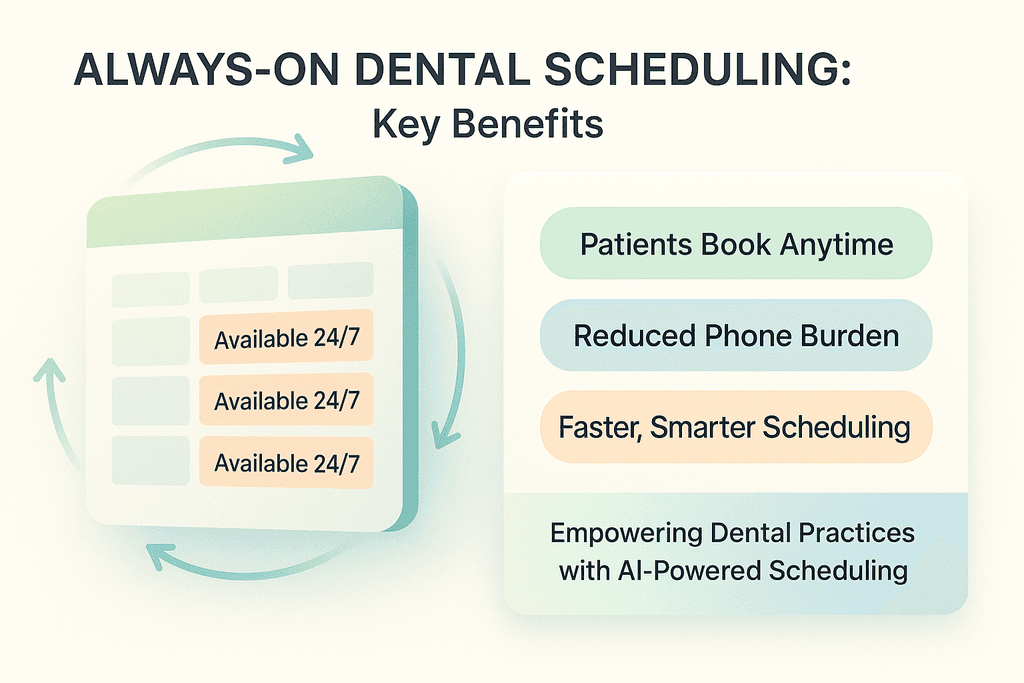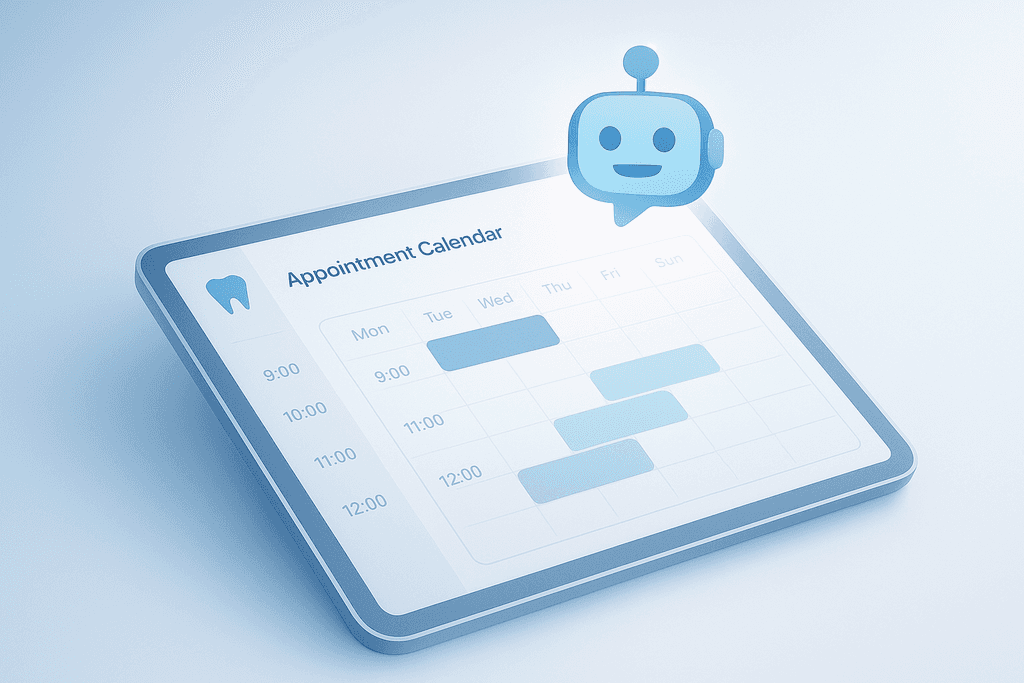Trying to schedule a dental appointment often feels like pulling teeth. Between juggling work commitments and family obligations, finding time to call during office hours can be a major hassle for busy patients. Dental chatbots are revolutionizing this process, offering 24/7 scheduling that fits seamlessly into hectic modern lifestyles.
Table of Contents
The Rise of Dental Chatbots
Did you know that 77% of patients prefer to book medical appointments online? This trend has sparked a digital revolution in healthcare scheduling, with dental practices at the forefront.

Chatbots first emerged in the 1960s as simple programs designed to mimic human conversation. Over decades, they evolved from novelty items to powerful customer service tools across industries. Today’s AI-powered chatbots can understand context, learn from interactions, and provide personalized responses.
In healthcare, chatbots offer unique advantages:
- 24/7 availability for patient inquiries
- Reduced wait times for simple questions
- Consistent, accurate information delivery
- Freeing up staff for complex tasks
Dental practices have embraced chatbot technology to streamline operations and improve patient experience. These specialized “dental chatbots” are designed to handle common tasks like:
- Scheduling appointments
- Answering frequently asked questions
- Providing post-treatment care instructions
- Sending appointment reminders
The benefits for dental offices are significant:
- Reduced phone traffic
- Improved appointment booking rates
- Enhanced patient satisfaction
- More efficient use of staff time
As chatbot technology continues to advance, dental practices are finding new ways to integrate these tools into their patient care strategies. For example, The OnCall Bot offers 24/7 support for dental practices, handling everything from appointment requests to personalized care information.
| Chatbot Impact on Dental Practices | Percentage |
|---|---|
| Reduction in missed appointments | 25% |
| Increase in patient satisfaction | 35% |
| Decrease in staff phone time | 40% |
With these impressive results, it’s no wonder that dental chatbots are becoming an essential tool for modern practices looking to enhance patient care and operational efficiency.
As we explore the world of dental chatbots, it’s clear that this technology is more than just a trend – it’s a practical solution to real challenges faced by dental practices and their patients. Let’s dive deeper into how these digital assistants are making scheduling stress-free for busy patients.
24/7 Availability Transforms Patient Access
Imagine needing to schedule a dental appointment at 11 PM on a Sunday. Sounds impossible, right? Not anymore. Dental chatbots are changing the game for busy patients who can’t always call during office hours.
These AI assistants work around the clock, giving patients the freedom to book appointments whenever it’s convenient for them. No more phone tag or waiting on hold.
- Late-night scheduling – perfect for night owls and shift workers
- Weekend booking – plan your dental care when you have time to think
- Early morning requests – set up appointments before your workday begins
This 24/7 access does more than just make life easier. It actually helps people get the care they need. When booking is a breeze, patients are less likely to put off important check-ups or treatments.
The OnCall Bot offers this always-on scheduling, helping dental practices provide better service without burning out their staff. It’s a win-win for everyone involved.
Personalized Interactions Ease Scheduling Anxiety
Let’s face it – some people get nervous about calling the dentist. Chatbots can take the edge off by providing a low-pressure way to book appointments.
- Natural conversations that feel human-like
- Patient history used to give relevant info
- Ability to ask questions without feeling rushed
These AI assistants use smart language processing to understand what patients are asking. They can even pick up on context clues to give more helpful responses.
For example, if someone mentions they’re anxious about dental visits, the bot might suggest scheduling during quieter times of day. It’s this kind of personalized touch that can make a big difference.
- No judgment or pressure
- Take your time to think through options
- Get answers to common questions instantly
By making scheduling feel more like chatting with a friendly receptionist, these bots help reduce the stress of booking dental care. This can lead to more regular visits and better overall oral health.

Streamlined Efficiency for Patients and Practices
Chatbots aren’t just good for patients – they’re a huge help for dental offices too. They take care of routine tasks, freeing up staff to focus on more complex patient needs.
| Task | Time Saved (per week) | Staff Benefit |
|---|---|---|
| Appointment scheduling | 10-15 hours | More time for patient care |
| Answering FAQs | 5-8 hours | Reduced phone interruptions |
| Sending reminders | 3-5 hours | Fewer no-shows |
This efficiency boost isn’t just about saving time. It’s about improving the overall patient experience. When staff aren’t constantly juggling phone calls, they can give more attention to the patients in the office.
Plus, chatbots can integrate with existing practice management systems. This means appointments booked through the bot show up right in the office schedule, no manual entry needed.
The result? A smoother-running practice that can handle more patients without sacrificing quality of care. It’s no wonder more dental offices are turning to solutions like The OnCall Bot to streamline their operations.
By automating routine tasks and providing 24/7 scheduling options, dental chatbots are making life easier for both patients and practices. They’re not replacing human interaction, but enhancing it – ensuring that when patients do talk to staff, it’s for the things that really matter.
As we look to the future of dental care, it’s clear that AI assistants will play a big role in keeping our smiles healthy and our schedules stress-free.

The Future of Dental Scheduling
Dental chatbots are changing the game for patient scheduling. These AI assistants work around the clock, giving patients the freedom to book appointments whenever it’s convenient for them. But that’s just the beginning of how chatbots could reshape dental practices.
Let’s look at some exciting possibilities on the horizon:
- Smart scheduling based on patient history
- Integration with wearable devices to suggest preventive visits
- Personalized reminders tailored to each patient’s communication preferences
- Automated follow-ups to ensure patients don’t miss important treatments
As chatbots get smarter, they’ll be able to do more than just book appointments. They could analyze a practice’s schedule and patient data to suggest the best times for different types of procedures. This optimization could lead to smoother operations and happier patients.
Of course, there are some hurdles to overcome before we see widespread adoption:
- Privacy concerns around health data
- Integration with existing practice management software
- Training staff to work alongside AI assistants
- Ensuring chatbots can handle complex scheduling scenarios
Despite these challenges, the potential benefits are huge. Practices using chatbots like The OnCall Bot are already seeing improvements in patient satisfaction and office efficiency. As the technology evolves, we can expect even more impressive results.
One dental office that’s embraced chatbot technology is Silver State Dentists. Their case study shows how implementing live chat support led to a 30% increase in new patient bookings. This real-world example highlights the power of always-on scheduling assistance.
The bottom line? Dental chatbots are making scheduling stress-free for busy patients today, and they’re paving the way for a more connected, efficient future in dental care. As these AI assistants become more sophisticated, they’ll play an increasingly vital role in helping practices deliver top-notch patient experiences.
Wrap-up
Dental chatbots are changing the game for busy patients who struggle to find time for appointments. With 24/7 availability and personalized interactions, these AI assistants make scheduling a breeze. Patients can book visits anytime, get quick answers, and avoid phone tag with the front desk.
For dental practices, chatbots like The OnCall Bot boost efficiency by handling routine tasks. This frees up staff to focus on in-office patient care. The detailed conversation logs also help practices stay on top of patient needs and follow-ups.
As dental care evolves, embracing tech solutions is key to keeping patients happy and practices running smoothly. Chatbots offer a win-win – better service for patients and streamlined operations for dental teams. To learn more about how AI can enhance your dental practice, check out our guide on AI call automation.
Have questions about implementing a dental chatbot? Our FAQ section below covers common queries to help you get started.
Common Questions About Dental Chatbots
How secure is my information when using a dental chatbot?
Dental chatbots use advanced encryption and security protocols to protect your personal information. They typically comply with HIPAA regulations, ensuring your data is as safe as it would be when speaking directly with your dental office. The OnCall Bot, for example, uses secure transcript management to maintain patient privacy.
Can I still talk to a human if I need to?
Absolutely. While chatbots handle many routine inquiries, they’re designed to seamlessly transfer complex issues or urgent matters to human staff. If you prefer speaking with a person, most dental practices offer that option during business hours.
Are chatbots difficult for older patients to use?
Not at all. Modern dental chatbots are designed with user-friendliness in mind. They use simple language and straightforward interfaces that are easy for patients of all ages to navigate. Many older patients find chatbots convenient for quick questions or appointment requests without the need for phone calls.
How do chatbots handle complex scheduling needs?
Dental chatbots are programmed to manage various scheduling scenarios. For simple appointments, they can often complete the booking process. For more complex needs, like multiple procedures or special accommodations, chatbots gather initial information and then alert the dental staff to follow up personally, ensuring all patient needs are met accurately.
What types of questions can dental chatbots answer?
Dental chatbots can address a wide range of topics, including office hours, services offered, insurance information, and basic dental care advice. They’re particularly good at handling frequently asked questions, freeing up staff time for more complex patient needs. For specialized queries, they can direct patients to the appropriate resources or staff members.

No responses yet